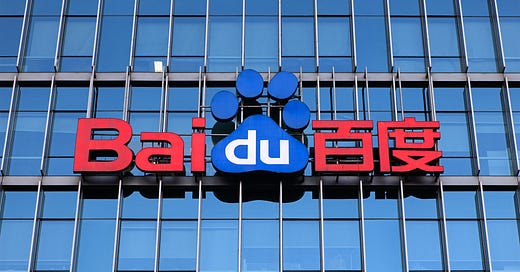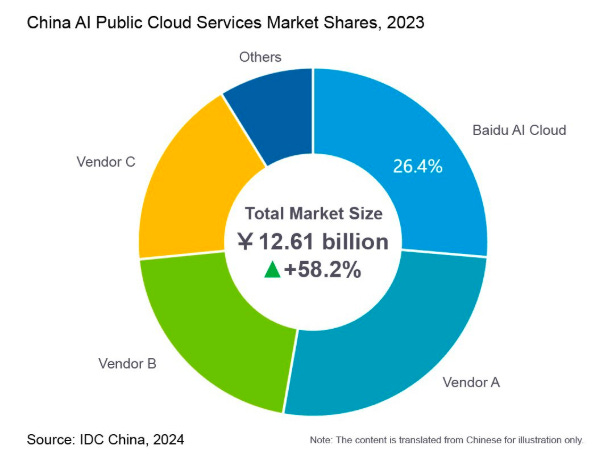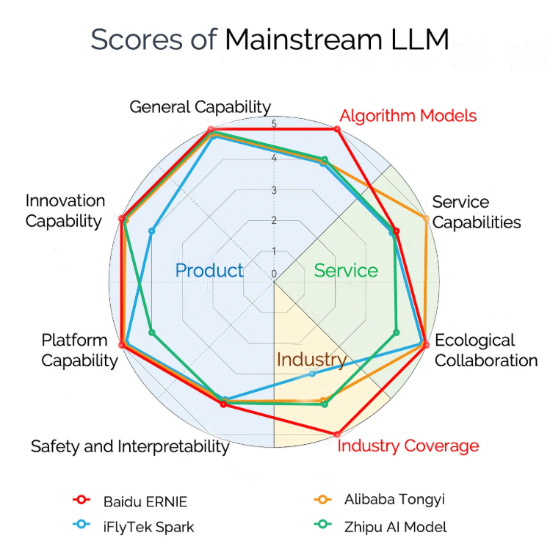(BIDU) Baidu Investment Thesis
A high-quality, high-growth AI business trading at 5x EBITDA and 20% discount to NAV
I recently made the decision to invest in Baidu, a company I believe is deeply mispriced by the market. As a value investor, I’m always searching for opportunities where a high-quality business is trading well below its intrinsic value due to market misconceptions. Baidu fits this mold perfectly—priced as if it’s a company in decline, despite having massive long-term growth catalysts like artificial intelligence.
For years, Baidu has been unfairly dismissed as just "China’s Google," with the assumption that search is a stagnating business. But that narrative is outdated. While search remains its cash cow, Baidu has spent the last decade aggressively investing in AI, cloud computing and autonomous driving.
Yet the market still refuses to give Baidu credit for its transformation. It’s valued like a company in decline, despite sitting on billions in cash, dominating AI in China, and leading the commercialization of self-driving technology.
The result? A high-quality, high-growth AI business trading at a deep value price; an opportunity that’s becoming increasingly rare in today’s market.
Level up your investment research with Koyfin's powerful market analytics platform. I've been using their comprehensive dashboards, real-time data, and intuitive charting tools to make more informed financial decisions. Try Koyfin today using my referral link and get 20% OFF any paid plan.
1) Business Overview
While Baidu's legacy as "the Google of China" accurately reflects its historical dominance in search, defining the company solely by this metric is increasingly reductive and overlooks its strategic evolution. Baidu's search engine remains a cornerstone of the Chinese internet, commanding a substantial market share (54%) and serving as a primary digital gateway for hundreds of millions of users.
This established business is not merely a legacy asset; it's a highly profitable, cash-generating engine that provides the financial foundation for Baidu's ambitious forays into new technological frontiers. The consistent revenue and profitability from search operations are critical, enabling Baidu to invest aggressively in long-term growth initiatives and navigate short-term market fluctuations with resilience.
However, Baidu's strategic narrative has shifted decisively towards artificial intelligence. Over the past decade, the company has embarked on a deliberate and well-funded transformation, allocating billions of dollars to research and development across the spectrum of AI technologies. This commitment is a fundamental reorientation of the company's strategic priorities, with AI now positioned as the central driving force for future growth and innovation. This transformation is manifesting across several key business segments:
1. Baidu AI Cloud
Baidu AI Cloud has rapidly emerged as a key player in China’s cloud computing industry, challenging Alibaba Cloud and Tencent Cloud. Unlike traditional providers, Baidu differentiates itself with deep AI integration, positioning itself as an AI-first platform that delivers intelligent, adaptive solutions for enterprises, industries, and government initiatives.
A major strength of Baidu AI Cloud is its ability to provide AI-powered solutions across various sectors. In manufacturing, it enables predictive maintenance, quality control, and supply chain optimization. The energy sector benefits from AI-driven analytics for grid stability and power distribution, while logistics companies utilize real-time data processing to streamline operations.
Beyond enterprise solutions, Baidu is a leader in smart city development. Partnering with municipal governments, it integrates AI into urban infrastructure to enhance traffic management, public security, and city planning. These efforts align with China’s push for AI-driven urban transformation.
What sets Baidu apart is its AI-as-a-Service (AIaaS) model, which lowers the barrier to AI adoption. Businesses can seamlessly integrate machine learning, NLP, and big data analytics without extensive in-house expertise.
With China’s cloud computing market expanding rapidly, Baidu AI Cloud is well-positioned to lead this transformation, combining cutting-edge AI research with scalable cloud infrastructure to redefine the industry.
2. Apollo Autonomous Driving
Baidu's Apollo platform stands as a testament to its leadership in autonomous driving technology, positioning the company at the forefront of China’s self-driving revolution. Recognized as one of the world's most advanced autonomous driving programs, Apollo is defined by its open-source framework and extensive ecosystem partnerships. By collaborating with leading global automakers, technology suppliers, and government entities, Baidu is accelerating the development and deployment of autonomous driving solutions across a wide range of applications.
A key milestone in Apollo's commercialization is Apollo Go, Baidu’s RoboTaxi service, which is already operational in major Chinese cities, including Beijing, Shanghai, and Wuhan. With tens of thousands of fully driverless rides successfully completed, Apollo Go is proving its real-world viability and scalability. Baidu has secured regulatory approvals to operate fully autonomous taxis without safety drivers, underscoring its technological readiness and the government's support for self-driving innovation.
Beyond RoboTaxis, Apollo's autonomous driving technology extends to multiple high-growth sectors. Autonomous trucking and logistics are emerging as crucial areas of expansion, leveraging Apollo’s AI-driven capabilities to enhance efficiency in freight transport and last-mile delivery. Additionally, Apollo is actively contributing to the development of smart transportation infrastructure, integrating AI-powered traffic management systems that optimize urban mobility, reduce congestion, and improve road safety.
Baidu's continued investment in Apollo reflects its long-term commitment to shaping the future of mobility. With advancements in AI perception, high-definition mapping, and vehicle-to-infrastructure (V2X) communication, Apollo is evolving into a comprehensive ecosystem for autonomous transportation. As China accelerates its push towards widespread autonomous adoption, Baidu is well-positioned to capitalize on this transformation, cementing its role as a leader in the global autonomous driving industry.
3. ERNIE Foundation Model
Baidu's ERNIE Foundation Model represents one of the most significant advancements in China's AI landscape, positioning Baidu as a leader in the generative AI space.
Developed through years of dedicated research and substantial investment, ERNIE is designed to power a broad range of applications, from search enhancements and AI-powered content generation to intelligent customer service and advanced data analytics. Unlike traditional AI models, ERNIE is built with deep contextual understanding and multimodal capabilities, making it a versatile and powerful AI engine that is seamlessly integrated into Baidu’s digital ecosystem.
A key milestone in Baidu’s AI evolution is ERNIE 4.0, an advanced foundation model that rivals GPT-4 in general capabilities. With its ability to process and generate human-like text, analyze visual information, and engage in cross-modal learning, ERNIE 4.0 is being deployed across industries such as finance, healthcare, manufacturing, and smart city development.
The model supports enterprise solutions, helping businesses integrate AI into their operations with high efficiency and adaptability. Baidu’s advancements in biocomputing also reinforce ERNIE’s capabilities in scientific research, optimizing protein structure predictions and enhancing complex data processing for the pharmaceutical sector.
Beyond its technical strengths, ERNIE’s expansion is directly linked to the rapid growth of Baidu AI Cloud, which plays a critical role in scaling its capabilities. According to IDC China, Baidu AI Cloud leads China’s AI market, holding 32.4% of the Model as a Service (MaaS) market and 17% of AI Foundation Model Solutions. This dominant position enables Baidu to provide scalable AI solutions to enterprises, accelerating the adoption of ERNIE across various sectors.
The competition in China’s AI sector is fierce, but ERNIE continues to stand out. A comparative analysis of mainstream large language models highlights ERNIE’s superiority in areas such as algorithm models, general capability, and innovation. Baidu’s AI model surpasses competitors like Alibaba Tongyi, iFlyTek Spark, and Zhipu AI, reinforcing its position as a leading generative AI model in China. The graph below illustrates ERNIE’s performance across multiple dimensions, demonstrating its technological edge in an increasingly AI-driven economy.
Baidu’s commitment to AI innovation ensures that ERNIE will remain at the forefront of China’s AI evolution. As the Chinese government pushes for greater AI self-sufficiency, ERNIE is well-positioned to become a critical tool in the nation’s digital transformation. With continuous updates, increased enterprise adoption, and seamless integration into Baidu’s ecosystem, ERNIE is not just an AI model—it is a strategic asset that is shaping the future of AI in China.
4. iQIYI: A Hidden Gem in Baidu's Portfolio
While Baidu's AI and cloud initiatives drive its transformation, iQIYI, China's leading online video platform, remains a valuable yet underappreciated asset. Often called "the Netflix of China," iQIYI offers both subscription and ad-supported streaming, producing diverse original content.
Although now a separate public company, Baidu retains a significant 46% stake, a key asset often overlooked in Baidu's valuation. After years of investment, iQIYI is now prioritizing profitability and cost efficiency, resulting in improving margins, sustainable free cash flow, and stronger monetization of premium content. This turnaround from a cash-burning model significantly enhances its value.
Baidu's iQIYI stake offers several strategic advantages:
Potential for significant equity appreciation as iQIYI's financial performance improves.
Monetization flexibility: Baidu can reduce or sell its stake to unlock shareholder value.
AI integration opportunities: Leveraging Baidu's generative AI to enhance iQIYI's content recommendations, user engagement, and ad targeting.
While not core to Baidu's AI strategy, iQIYI's 46% ownership represents a valuable, publicly traded, income-generating asset that adds considerable hidden value to Baidu's overall investment case.
In summary, Baidu today is not merely a search engine company; it is a rapidly evolving AI ecosystem. Its core search business provides a robust financial foundation, while its strategic investments in AI Cloud, Apollo, and ERNIE are positioning it for leadership in key growth sectors within China's digital economy. This multifaceted transformation, however, remains largely underappreciated by the market, creating a compelling value investment opportunity.
2) Investment Thesis
Baidu’s valuation is, quite simply, irrational. The numbers tell the story:
Keep reading with a 7-day free trial
Subscribe to Coughlin Capital to keep reading this post and get 7 days of free access to the full post archives.









